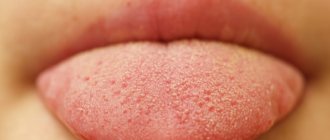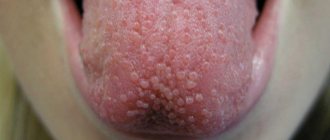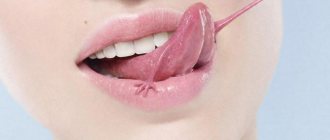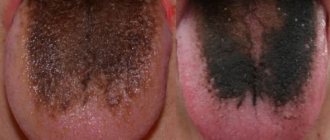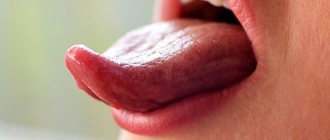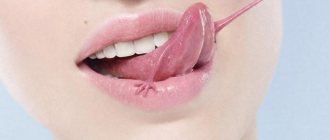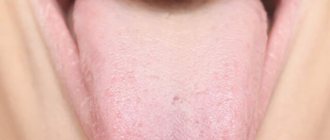September 17, 2018
The brown color in nature is very symbolic; it represents the primitive life force coming from the warm earth, the ancestor of all beginnings. But a person who chooses this shade is characterized as insecure and tired, in need of peace and relaxation, deprived of good health. But this color can appear not only in this way; for example, some may notice a brown coating on the tongue. What is this? This is undoubtedly a reason to be wary. And we’ll tell you why this needs to be done in an article prepared by the editors of the UltraSmile.ru portal.
Why does a brown coating appear on the tongue?
Fact No. 1: if you managed to quickly get rid of plaque, then there is no reason to worry
Are you finding out why your tongue has acquired a brown coating or some other color? Check whether this tint is the result of exposure to certain drinks and foods, a consequence of their frequent or recent consumption. Because if this is really the case, then there is no reason to panic. Plaque caused by drinking coffee, tea, chocolate and other products rich in tannins and brown dyes can be easily removed during a standard procedure using a regular toothbrush with toothpaste, irrigator, and rinse.
Do not forget one more important feature: a brown coating on the tongue, when excluding food dyes, diseases and pathologies, almost always indicates active smokers. At the same time, not only the tongue, but also the mucous membranes and even the teeth are painted in this unpleasant color.
If the plaque is easily washed off, then there is no reason to worry
A characteristic color also occurs in those patients who have undergone drug therapy for a long time, in particular, they have used certain groups of drugs (Faringosept, antibiotics, Malavit, medications with bismuth) - they affected the course of metabolic processes in the body and led to such an unpleasant result. This is a reason to cancel such medications. And for smokers, such a symptom is another excellent proof that it’s time to quit smoking, otherwise it’s easy to lose all your teeth as a result of periodontitis or periodontal disease.
Black coating on the tongue
Black plaque looks especially scary; it can occur with long-term use of antibiotics and a number of other medications, and can also indicate a number of diseases:
- infectious disease, in particular cholera;
- Crohn's disease;
- acidosis – PH disturbance;
- viral sore throat.
A dark tongue may have a purple tint, which indicates blood diseases, including anemia. A plaque with a blue tint is one of the symptoms of dangerous diseases such as dysentery and typhoid.
Fact No. 2: brown color is one of the signs of problems with internal organs
A brown coating on the tongue in adults or children has different causes, but almost always indicates that at least one of your internal organs has become infected. And, with a greater degree of probability, of all possible cases, the problem is localized in the intestines or stomach1.
Important!
The surface of the tongue is covered with microscopic papillae, which are actively involved in determining various taste sensations.
On top, the papillae are protected by a thin epithelium, which, with good immunity, constantly dies and is renewed. If disturbances are detected in the body, the epithelium becomes denser and ceases to renew itself. And given that the smallest particles of food and plaque periodically settle on it, the mucous membrane becomes the best and most convenient environment for the proliferation of bacteria. The tongue is a kind of mirror of the body. It can consider even the earliest and first signs of infectious and non-infectious diseases. It is also a muscular organ and a kind of receptor that transmits signals to other organs, in particular to the digestive tract, as a result of which metabolic processes are launched in it and enzymes are produced. If the stomach or intestines are sick, then the exact opposite reaction occurs, nerve signals go from them to our tongue. He, trying to protect himself from troubles, reacts in this way: a brown coating appears.
Stomach diseases can cause tongue problems
So, why does a brown coating appear on the tongue? Check for the presence of gastritis, ulcers, dysbacteriosis, inflammation in the intestines (the large or small intestine, duodenum may suffer), hepatitis or cholecystitis, diseases of the biliary tract.
However, a brown coating on the tongue is not always due to stomach problems. The reasons are varied: dehydration, oral candidiasis (thrush), food poisoning, violation of the regime or technique of oral hygiene procedures, dental diseases and problems, pulmonary failure, vitamin deficiency (in particular, we are talking about vitamins B3 or PP), diseases hematopoietic system (anemia or hemolysis), problems with the adrenal glands, stomatitis and even the immunodeficiency virus.
Prevention
The best method to avoid the problem is to carry out preventive procedures. In the case when plaque is not a signal of a serious disease of the internal organs, it is enough to adhere to a number of rules:
- give up bad habits: smoking and alcohol;
- exclude drinks with a high caffeine content from the diet;
- adhere to proper nutrition;
- build your diet correctly ;
- include foods high in fiber in the menu;
- increase the amount of fermented milk products in the diet;
- give up spicy, salty, fried foods;
- carry out oral hygiene
- prevent intestinal dysbiosis
- a comprehensive at least once a year and promptly treat diseases of internal organs.
Following the rules of prevention will not only help you get rid of plaque on your tongue, but also significantly improve your health. Properly structured nutrition has a positive effect on the digestive organs and helps normalize metabolism. A diet enriched with vitamins and minerals recharges the body with energy.
Fact No. 3: shade indicates different pathologies
For example, dark brown plaque indicates that the disease is in an advanced stage (liver, pancreas, gall bladder), and the body in this case needs strong therapeutic support. An adult or child who has a brown coating on the tongue may experience soreness, bitterness in the mouth, nausea and vomiting, and pain in the hypochondrium.
Brown coating on the tongue can also be light, then the cause should be sought in problems with the respiratory system or joints. Light-colored plaque is typical for asthmatics and those who suffer from pneumonia and bronchial inflammation.
“One morning I noticed in the mirror while getting ready for work that my entire tongue was brown in my mouth. To be honest, I was very scared, I tried scrubbing with a brush and even an irrigator and a special nozzle to clean it, but it didn’t help. Then I made an appointment with my local therapist, and after blood tests he sent me to a gastroenterologist. It turned out that I have fibrous gastritis. And before that, about a year ago, I suffered from scarlet fever, and these were the sad consequences it had. It’s scary, it’s offensive, but there’s nowhere to go - I’m getting treatment now and I’m glad that I went to the appointment on time and didn’t read on the Internet how to deal with it on my own, although I was tempted.”
Alena, 33 years old, Krasnoyarsk region, review from the website woman.ru.
Different shades of color indicate different pathologies.
A yellowish-brown tongue may indicate causes such as alcoholism and liver hepatosis. Often it also indicates poisoning by chemical, synthetic or toxic substances. A similar situation is often observed among drug addicts, but ordinary people with gastritis and stomach ulcers can also find a similar color.
If the color of your brown tongue is also mixed with a green tint, then this is a reason to adjust your diet, enriching it with vitamins, eliminating fatty foods and all sorts of harmful things, and stopping treatment with antibiotics, if they occur. Well, get checked for fungal infections of the oral cavity to rule out stomatitis or candidiasis.
Why does the coating on the tongue have spots?
In most cases, spots on the tongue have nothing to do with dangerous conditions and diseases. However, it is imperative to find out their cause and pay attention to eliminating the causative factors.
What types of spots exist and why do they appear:
- the tip of the tongue turns red and goes numb - most likely this happened as a result of injury (burn from hot, spicy food, smoking), and problems in the intestines and heart are also possible;
- bright pink spots on the tongue - depending on the size and location, they can be caused by a deficiency of vitamin B12, folic acid or the development of scarlet fever, migratory glossitis;
- bright red spots on a pale tongue are a symptom of scarlet fever, but also appear against the background of anemia, in smokers;
- red dots combined with a whitish coating at the root of the tongue most likely indicate diseases of the digestive system.
Fact No. 4: the type and structure of plaque matters
Agree, when there is a brown coating on your tongue, it is not a pleasant sight. However, if, for example, it is still very thin, then you have every chance to get rid of the disease quickly and even brush it off with an ordinary toothbrush. But if it is dense in structure and consistency and cannot be removed even with a special scraper, then it’s time to run to a specialist, since chronic stages of diseases rarely respond to conservative therapy, and minutes can already count.
Important!
A light brown or white coating on the tongue in the morning, after sleep, is a completely normal phenomenon, indicating that during sleep, dead epithelial cells could not be removed naturally: without oral hygiene or mechanical cleaning with food.
If they come off easily during your morning brushing, then there is no cause for concern. Do you regularly find a brown coating on your tongue in the morning? Carefully observe its appearance, color, density and consistency:
- if it is dry: this is evidence that the problem should be sought in a malfunction of the salivary glands,
- if the bacterial film is wet: this is a clear sign of vitamin deficiency or thyroid disease.
Dense and hard plaque is a reason to consult a doctor.
Also pay attention to where the problem is visible. It can be localized in the very center of the tongue, which is responsible for the cardiovascular system, at the root - here is the area of influence of the digestive tract, at the tip - the sphere of the respiratory tract. In any case, if the problem bothers you for more than three days in a row, this is a serious reason to contact a specialist who, with the help of a comprehensive examination of the body (blood and stool tests, ultrasound of internal organs, radiography, probing), will be able to explain why a brown coating appeared on the tongue .
Notice
: Undefined variable: post_id in
/home/c/ch75405/public_html/wp-content/themes/UltraSmile/single-item.php
on line
45 Notice
: Undefined variable: full in
/home/c/ch75405/public_html/wp-content /themes/UltraSmile/single-item.php
on line
46
Rate this article:
( 1 ratings, average: 5.00 out of 5)
language
- Sokolova O.A., Avanesov A.M. Changes in the oral mucosa in pathology of the gastrointestinal tract. Electronic scientific and educational bulletin “Health and education in the XXI century”, 2009.
Homeopathic treatment of the problem
In the homeopathic approach, data on the condition of the tongue is considered not as specific signs, but as general physical signs that help to obtain a complete picture of the patient. If there is a brown coating on the tongue, for example, the following drugs can be used:
- Bryonia (Bryonia) - dry mouth, tongue with dark brown deposits.
- Carbo vegetabilis (Carbo vegetabilis) - the tongue is yellowish-brown with ulcers.
- Kali phosphoricum - brown tongue, bitter taste and dry mouth, especially in the morning.
- Medorrhinum (Medorrinum) - there is a brown coating on the tongue, it is thick and spongy.
When prescribing homeopathic medicines, not only the characteristics and location of the plaque are taken into account, but also the characteristics of the patient himself.
A person knows himself best, so it seems that you can easily choose a medicine yourself. This is a deceptive ease; you cannot self-medicate.
Note! Even a certified doctor with experience in homeopathic practice cannot always immediately select the appropriate remedy; there is too much to consider.
